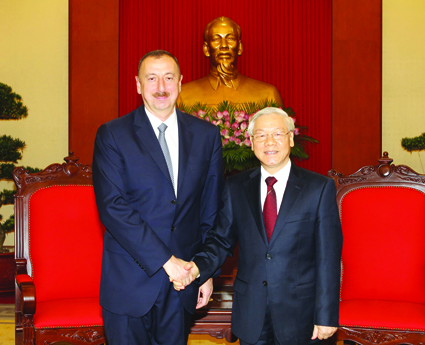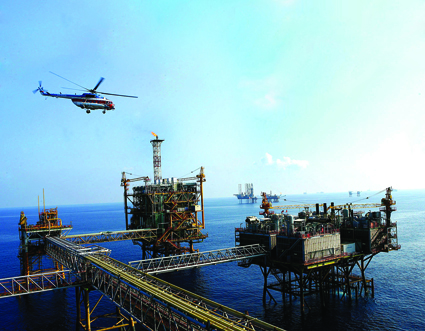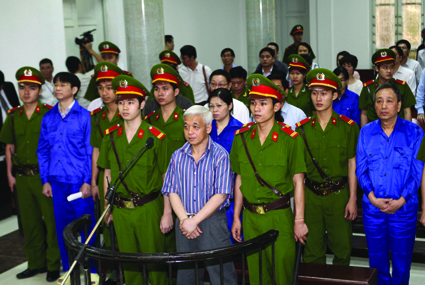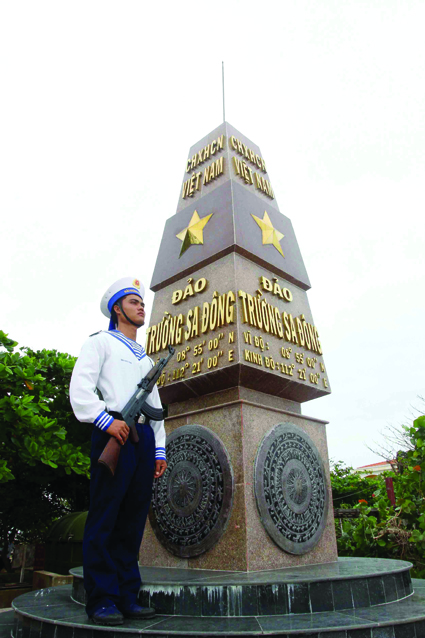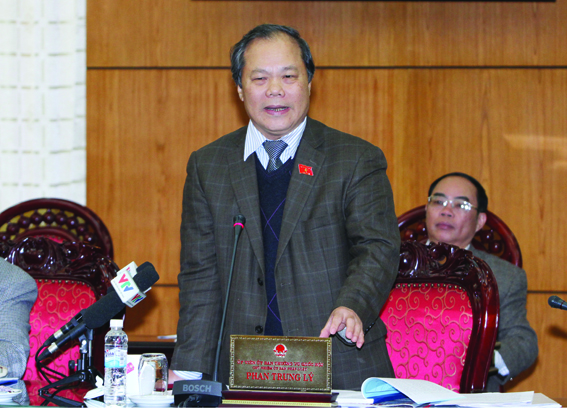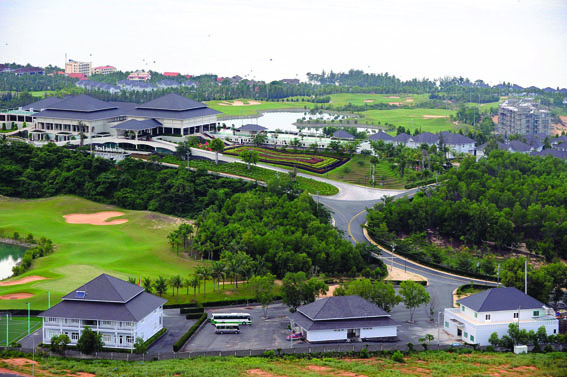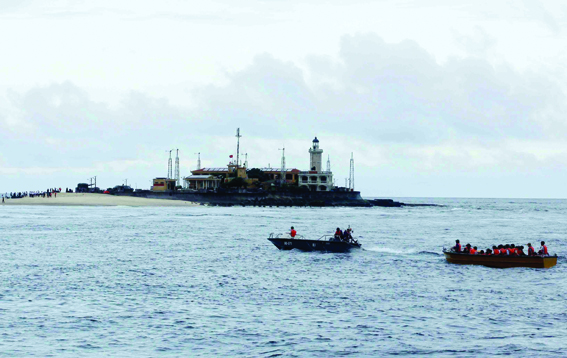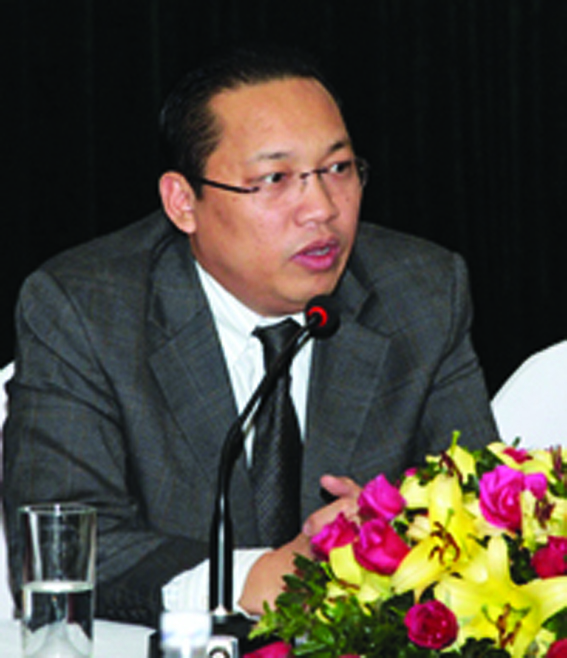Since May 1, 2014, China brazenly moved its deep-water oil rig escorted by over 80 armed and military vessels and many airplanes to the Vietnamese waters and installed the rig at the location which is 80 miles deep into Vietnam’s continental shelf and exclusive economic zone prescribed by the 1982 United Nations Convention on the Law of the Sea (1982 UNCLOS). China’s armed vessels aggressively fired high-power water cannons at and intentionally rammed the Vietnamese public-service and civil ships, causing damage to many ships and injuring many people on board. This is the first time China brazenly brings and installs its oil rig deep into the continental shelf and exclusive economic zone of an ASEAN country, which gravely violates the international law, the 1982 UNCLOS, and the Declaration on the Conduct of Parties in the East Sea (DOC) to which China is a signatory.

__Photo: Cong Dinh, Huu Trung/VNA
According to Nguyen Van Trung, deputy director of the Vietnam Fisheries Surveillance Department, by May 18, China had 134 ships of various kinds, including coastguard ships, warships, refueling ships and fishing vessels, around the oil rig.
Prime Minister Nguyen Tan Dung, in his speech at the 24th ASEAN Summit held on May 10-11 in Nay Pyi Taw, Myanmar, urged the ASEAN to strengthen solidarity over the East Sea issue.
“We express our deep gratitude to and urgently call on ASEAN members, other countries in the world, individuals and international organizations to continue voicing their protest against the above-mentioned acts of serious violation and support the legitimate demand of Vietnam.
In face of this extremely serious situation, Vietnam requests that ASEAN strengthen solidarity and unity, and strongly reaffirm the principles enshrined in the Six-Point Principles on the East Sea while demanding China to observe the international law, the 1982 UNCLOS, especially to respect the continental shelf and 200-mile exclusive economic zone of coastal countries, to fully and strictly implement the DOC, and to work with ASEAN for substantive negotiation on the Code of Conduct in the East Sea (COC).”
Vietnam has exercised utmost restraint, showed goodwill and exhausted all dialogue channels to communicate with the Chinese authorities of different levels for expressing protest and demanding China to immediately withdraw its oil rig and armed and military vessels from the Vietnamese waters. Nevertheless, up to now, China has failed to respond to Vietnam’s legitimate demand. On the contrary, China has been slandering and blaming Vietnam while continuing to escalate its increasingly dangerous and serious acts of violation, Dung said.
The Prime Minister said Vietnam vehemently denounced acts of infringement and would resolutely protect its national sovereignty and legitimate interests in conformity with international law.
In a statement on May 10, foreign ministers of the ASEAN members voiced their concern over the escalating tension in the East Sea, and called on the parties concerned to exercise self-restraint.
They reaffirmed the importance of maintaining peace and stability, maritime security, freedom of navigation in and over-flight above the East Sea as well as the ASEAN’s Six-Point Principles on the East Sea and the Joint Statement of the 15th ASEAN-China Summit on the 10th Anniversary of the DOC.
They also called on all parties to the DOC to undertake full and effective implementation of the DOC in order to create an environment of mutual trust and confidence. They emphasized the need for expeditiously working toward an early conclusion of the COC.
Japan on May 12 expressed support for ASEAN leaders’ calls for restraint and a de-escalation of tensions in the East Sea following Beijing’s placement of the oil rig in Vietnam’s waters.
“We hope that countries concerned will refrain from taking unilateral actions that will heighten the tensions, and act calmly in accordance with international law,” Chief Cabinet Secretary Yoshihide Suga said at a press conference.
On May 10, British Foreign Office Minister Hugo Swire said on an official website that the incident had led to increased tensions in the East Sea.
“The UK supports the EU statement issued on May 8 (which says that the EU was concerned about the incident involving China and Vietnam in the East Sea), and had raised the issue with the Chinese Government at the ministerial level. We urge all parties to exercise restraint and seek to de-escalate the situation,” Hugo said.
Support for Vietnam’s position in safeguarding the country’s sovereignty against China’s illegal placement of the oil rig in Vietnam’s waters continued to spread outside the country.
Hundreds of Vietnamese people living in Washington DC and surrounding areas on May 18 gathered in front of the Chinese Embassy to protest China’s actions in Vietnam’s waters.
The Vietnamese Entrepreneurs’ Association in the US also set up a website in English to spread about the illegality of China’s nine-dotted line in the East Sea. The association also plans to collect 100,000 signatures to send to the US Congress to oppose the line.
The same day, nearly 100 overseas Vietnamese and foreigners from New York city and Boston attended a meeting in front of the Chinese representative mission in New York city to raise their voice against China’s aggressive acts.
Vietnamese students in the US also sent letters to President Barack Obama and the US Senate to call on the US Government and international community to voice objection to China’s actions in Vietnam’s exclusive economic zone and continental shelf.
In another move, Vice President Joe Biden on May 15 at the White House expressed the US’s serious concern about China’s behavior at a meeting with Chinese People’s Liberation Army Chief of General Staff, Fang Fenghui.
Biden and other top officials expressed the view that Beijing’s behavior was “dangerous and provocative” and must stop. They said China’s actions with its neighbors in the East Sea were straining US-China relations and raised questions about whether Washington could work together with Beijing in Asia and on bilateral issues.
The same day, the US State Department issued another statement criticizing China’s provocative decision to place the oil rig.
Chairman of the Vietnamese Association in Britain in a meeting on May 15 called on overseas Vietnamese to join hands with the Government to protect the sovereignty. Members of the association’s executive board also demanded China to remove the oil rig and escort its vessels from Vietnam’s waters.
Australian Foreign Ministry also voiced concern over the issue in an announcement on its website on May 15, saying: “We share the serious concerns expressed by ASEAN over recent developments which have served to raise tensions in the region.
Australia urges the parties to exercise restraint, refrain from provocative actions that could escalate the situation and take steps to ease tensions.
Indonesian Foreign Minister Marty Natalegawa in a press statement on May 16 expressed “deep and profound concern” over China’s unilateral actions in the East Sea.
“Indonesia is particularly concerned by the real risk of a major escalation and miscalculation posed by the dangerous maneuvers by ships and naval ships at sea. These have caused loss of lives, injuries and material damage.”
“There’s only one option - a peaceful settlement of disputes,” he said, adding “The use of force, violations of international law, including the UN Convention on the Law of the Sea and the DOC have no place in our region today.”
The ministry called on China and Vietnam to “exert maximum restraint” and “avoid measures that further add to tensions and risk serious escalation.”
Domestically, Vietnamese Deputy Prime Minister and Foreign Minister Pham Binh Minh, in a phone conversation on May 15 with Chinese Foreign Minister Wang Yi, affirmed Vietnam’s strong objection to China’s recent actions on the East Sea and requested the latter to immediately remove the Haiyang-Shiyou 981 oil rig and its escorts from Vietnam’s exclusive economic zone.
Minh emphasized that China’s move had seriously and negatively affected the trust between the two countries and the friendship between the two peoples, adding that China’s actions went against agreements between the leaders of both countries, fundamental principles on resolving maritime issues and international law.
Minh also phoned the foreign ministers of Indonesia, Singapore and Russia to discuss boosting ties in light of the East Sea issue, telling about Vietnam’s diplomatic efforts to ease tension.
The foreign ministers said Vietnam and China should use restraint and settle disputes by peaceful solutions.
The Vietnam-ASEAN Friendship and Cooperation Association also issued a statement urging China to promptly withdraw the oil rig and vessels from Vietnamese waters and “not repeat such actions in the future.”
The Vietnam Lawyers’ Association on May 9 called on legal practitioners around the world to raise their voices to protect justice.
In a declaration on China’s illegal placement of the oil rig in Vietnam’s waters, released during a press conference in Hanoi, the association strongly condemned the Chinese side and requested it to immediately remove the oil rig and escorts from Vietnamese waters. The association also demanded that China avoid similar acts within Vietnam’s exclusive economic zone and continental shelf.
The association asked China to strictly implement the commitments in the DOC and abide by international law, especially the 1982 UNCLOS, which clearly stated that no nation can explore the continental shelf of a coastal nation or exploit its natural resources without the express consent of the state.
The Vietnam Peace Committee (VPC) wrote in its message to the Chinese People’s Association for Peace and Disarmament that the Vietnamese people had been profoundly concerned over China’s placement of the oil rig within the exclusive economic zone and continental shelf of Vietnam.
China’s actions adversely impacted the political trust between Vietnam and China and damaged the time-honored friendship between the peoples of the two countries, the committee stated.
“The VPC stands energetically against the above moves and proposes that the Chinese People’s Association for Peace and Disarmament take positive measures conducive to preserving the traditional relations of friendship and cooperation between the peoples of Vietnam and China,” the message read.
Peaceful protests erupted in major cities across the country like Hanoi, Ho Chi Minh City, Da Nang and Can Tho, with demonstrators shouting slogans demanding China to remove its oil rig from Vietnam’s waters. They expressed their belief in and strong support for the Party and State’s policy to protect the country’s sovereignty and peacefully settle disputes in the East Sea.-
